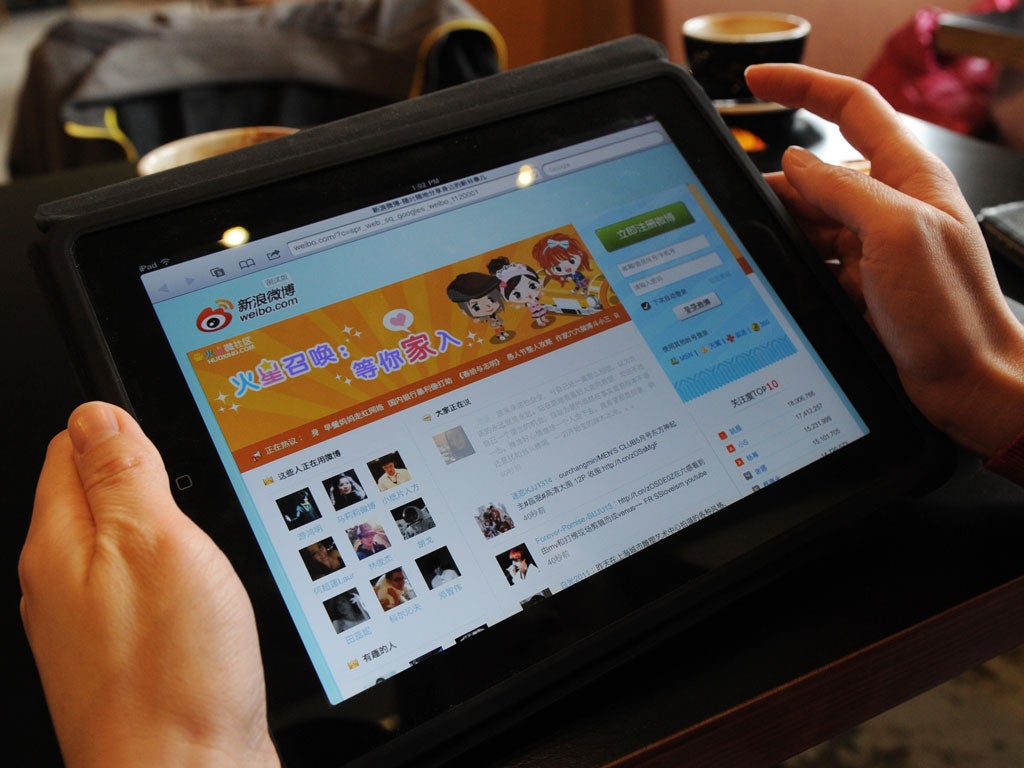State pressure blamed for new censorship on China's Twitter
Weibo users to face tighter restrictions on 'spreading rumours' and 'insulting the nation'

Your support helps us to tell the story
From reproductive rights to climate change to Big Tech, The Independent is on the ground when the story is developing. Whether it's investigating the financials of Elon Musk's pro-Trump PAC or producing our latest documentary, 'The A Word', which shines a light on the American women fighting for reproductive rights, we know how important it is to parse out the facts from the messaging.
At such a critical moment in US history, we need reporters on the ground. Your donation allows us to keep sending journalists to speak to both sides of the story.
The Independent is trusted by Americans across the entire political spectrum. And unlike many other quality news outlets, we choose not to lock Americans out of our reporting and analysis with paywalls. We believe quality journalism should be available to everyone, paid for by those who can afford it.
Your support makes all the difference.Social media users in China face tighter controls after the introduction of new rules aimed at preventing the spread of online rumours on Sina Weibo, the country's version of Twitter.
The service, which has 300 million members, has become a platform for Chinese citizens to criticise the government in ways that have never been possible before. But yesterday, the website introduced "user contracts" to curb controversial posts, with the rules thought to have come about amid pressure from Chinese authorities. The norms will strengthen the so-called Great Firewall of China – the country's system of internet controls.
Under the system, Sina Weibo users start off with 80 points, which are then deducted when they break the rules by "spreading rumours", encouraging gambling, "insulting the nation" or "calling for illegal protests", according to a posting on the website. If the balance of points falls to zero, users face the cancellation of their accounts.
The new regulations are believed to be the latest attempt by the authorities to contain the impact of the service. Even though micro-blogging in China started less than three years go, it has become enormously popular, with growth quadrupling last year. Nearly half of all Chinese internet users now use micro-blogs.
The government has previously forced Weibo's legions of micro-bloggers to use their own names, not nicknames or avatars. But the rumours and speculation sparked after the removal of the former Chongqing Communist Party boss, Bo Xilai, and the naming of his wife, Gu Kailai, as a suspect in the murder of British businessman Neil Heywood appears to have spurred additional action.
The new controls were introduced as the capital was gripped by rumours about the next stage in the purge of Bo Xilai and the progress of the power struggle within the Party's upper echelons. Authorities shut 16 websites and detained six people for "fabricating or disseminating online rumours" about military vehicles entering Beijing, while Weibo and other sites such as Tencent's QQ, were "criticised and punished accordingly", and their comments sections closed.
But despite attempting to exert control, the authorities have been often hamstrung by the ability of micro-bloggers to find ways around the restrictions they impose. For example, as soon as the words "Bo Xilai" are banned, online users start tweeting "BXL". The new rules are aimed at closing these loopholes.
Officially, the measures have been introduced by Weibo. But it is generally thought that Sina, the technology giant that owns Weibo, is trying to show its good corporate credentials to the Chinese government by helping with self-censorship and avoiding possible censure in the future.
Join our commenting forum
Join thought-provoking conversations, follow other Independent readers and see their replies
Comments